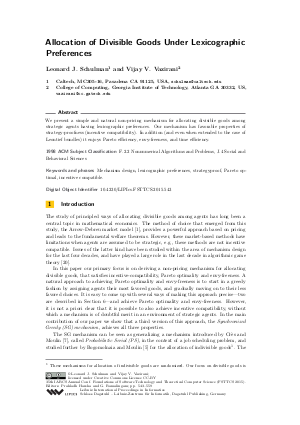Allocation of Divisible Goods Under Lexicographic Preferences
Authors Leonard J. Schulman, Vijay V. Vazirani
-
Part of:
Volume:
35th IARCS Annual Conference on Foundations of Software Technology and Theoretical Computer Science (FSTTCS 2015)
Part of: Series: Leibniz International Proceedings in Informatics (LIPIcs)
Part of: Conference: IARCS Annual Conference on Foundations of Software Technology and Theoretical Computer Science (FSTTCS) - License:
 Creative Commons Attribution 3.0 Unported license
Creative Commons Attribution 3.0 Unported license
- Publication Date: 2015-12-14
File

PDF
LIPIcs.FSTTCS.2015.543.pdf
- Filesize: 0.99 MB
- 17 pages
Document Identifiers
Subject Classification
Keywords
- Mechanism design
- lexicographic preferences
- strategyproof
- Pareto optimal
- incentive compatible
Metrics
- Access Statistics
-
Total Accesses (updated on a weekly basis)
0PDF Downloads0Metadata Views
Abstract
We present a simple and natural non-pricing mechanism for allocating divisible goods among strategic agents having lexicographic preferences. Our mechanism has favorable properties of strategy-proofness (incentive compatibility). In addition (and even when extended to the case of Leontief bundles) it enjoys Pareto efficiency, envy-freeness, and time efficiency.
Cite As Get BibTex
Leonard J. Schulman and Vijay V. Vazirani. Allocation of Divisible Goods Under Lexicographic Preferences. In 35th IARCS Annual Conference on Foundations of Software Technology and Theoretical Computer Science (FSTTCS 2015). Leibniz International Proceedings in Informatics (LIPIcs), Volume 45, pp. 543-559, Schloss Dagstuhl – Leibniz-Zentrum für Informatik (2015)
https://doi.org/10.4230/LIPIcs.FSTTCS.2015.543
BibTex
@InProceedings{schulman_et_al:LIPIcs.FSTTCS.2015.543,
author = {Schulman, Leonard J. and Vazirani, Vijay V.},
title = {{Allocation of Divisible Goods Under Lexicographic Preferences}},
booktitle = {35th IARCS Annual Conference on Foundations of Software Technology and Theoretical Computer Science (FSTTCS 2015)},
pages = {543--559},
series = {Leibniz International Proceedings in Informatics (LIPIcs)},
ISBN = {978-3-939897-97-2},
ISSN = {1868-8969},
year = {2015},
volume = {45},
editor = {Harsha, Prahladh and Ramalingam, G.},
publisher = {Schloss Dagstuhl -- Leibniz-Zentrum f{\"u}r Informatik},
address = {Dagstuhl, Germany},
URL = {https://drops.dagstuhl.de/entities/document/10.4230/LIPIcs.FSTTCS.2015.543},
URN = {urn:nbn:de:0030-drops-56279},
doi = {10.4230/LIPIcs.FSTTCS.2015.543},
annote = {Keywords: Mechanism design, lexicographic preferences, strategyproof, Pareto optimal, incentive compatible}
}
Author Details
References
-
K. Arrow and G. Debreu. Existence of an equilibrium for a competitive economy. Econometrica, 22:265-290, 1954.

-
R. Aumann and M. Maschler. Game theoretic analysis of a bankruptcy problem from the Talmud. J. Economic Theory, 36:195-213, 1985.

-
H. Aziz, S. Gaspers, S. Mackenzie, N. Mattei, N. Narodytska, and T. Walsh. Equilibria under the probabilistic serial rule. In Proceedings of the Twenty-Fourth International Joint Conference on Artificial Intelligence, IJCAI'15, pages 1105-1112, 2015.

-
S. Barberà and M. O. Jackson. Strategy-proof exchange. Econometrica, 63(1):51-87, 1995.

-
A. Bogomolnaia and H. Moulin. A new solution to the random assignment problem. Journal of Economic Theory, 100:295-328, 2001.

-
W. J. Cho. Probabilistic assignment: A two-fold axiomatic approach. 2012.

-
H. Crès and H. Moulin. Scheduling with opting out: improving upon random priority. Operations Research, 49(4):565-577, 2001.

-
P. Dasgupta, P. Hammond, and E. Maskin. The implementation of social choice rules. Review of Economic Studies, 46:153-170, 1979.

-
D. Gale. College course assignments and optimal lotteries. Mimeo, University of California, Berkeley, 1987.

-
A. Ghodsi, M. Zaharia, B. Hindman, A. Konwinski, S. Shenker, and I. Stoica. Dominant resource fairness: fair allocation of multiple resource types. In Proc. 8'th USENIX conference on networked systems design and implementation, 2011.

-
M. Hausner. Multidimensional utilities. In R. L. Davis, R. M. Thrall, and C. H. Coombs, editors, Decision Processes, pages 167-180. Wiley, 1954.

-
L. Hurwicz. On informationally decentralized systems. In C. B. McGuire and R. Radner, editors, Decision and Organization, pages 297-336. North-Holland, Amsterdam, 1972.

-
M. Kaminski. Hydraulic rationing. Mathematical Social Sciences, 40:131-155, 2000.

-
M. Kato and S. Ohseto. Toward general impossibility theorems in pure exchange economies. Social Choice and Welfare, 19:659-664, 2002.

-
A. Katta and J. Sethuraman. A solution to the random assignment problem on the full preference domain. Journal of Economic Theory, 131:231-250, 2006.

-
F. Kojima. Random assignment of multiple indivisible objects. Mathematical Social Sciences, 57(1):134-142, 2009.

-
J. Li and J. Xue. Egalitarian division under Leontief preferences. Manuscript, 2012.

-
A. Mas-Colell, M. D. Whinston, and J. R. Green. Microeconomic theory. Oxford University Press, 1995.

-
A. Nicolo. Efficiency and truthfulness with Leontief preferences. Review of Economic Design, 8(4):373-382, 2004.

-
N. Nisan. Introduction to mechanism design (for computer scientists). In N. Nisan, T. Roughgarden, E. Tardos, and V. V. Vazirani, editors, Algorithmic Game Theory, pages 209-241. Cambridge University Press, 2007.

-
B. O'Neill. A problem of rights arbitration from the Talmud. Mathematical Social Sciences, 2(4):345-371, 1982.

-
D. Saban and J. Sethuraman. A note on object allocation under lexicographic preferences. J. Mathematical Economics, 50:283-289, 2014.

-
M. Satterthwaite and H. Sonnenschein. Strategy-proof allocation mechanisms at differentiable points. Review of Economic Studies, 48:587-597, 1981.

-
L.J. Schulman and V. V. Vazirani. Allocation of divisible goods under lexicographic preferences. In arXiv, 1206.4366, 2012.

-
S. Serizawa. Inefficiency of strategy-proof rules for pure exchange economies. Journal of Economic Theory, 106:219-241, 2002.

-
S. Serizawa and J. Weymark. Efficient strategy-proof exchange and minimum consumption guarantees. Journal of Economic Theory, 109:246-263, 2003.

-
L. Zhou. On a conjecture by Gale about one-sided matching problems. J. Econ. Theory, 52:123-135, 1990.

-
L. Zhou. Inefficiency of strategy-proof allocation mechanisms in pure exchange economies. Social Choice and Welfare, 8(3):247-254, 1991.

